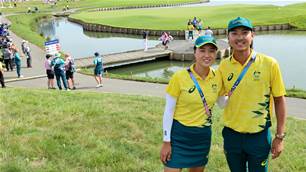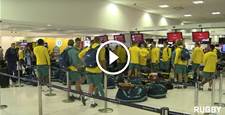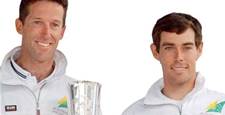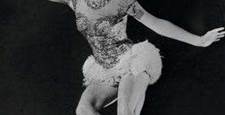Four times he faced third-and-final attempts at heights during the Olympic pole vault competition. Four times he cleared them.
Four times he faced third-and-final attempts at heights during the Olympic pole vault competition. Four times he cleared them.
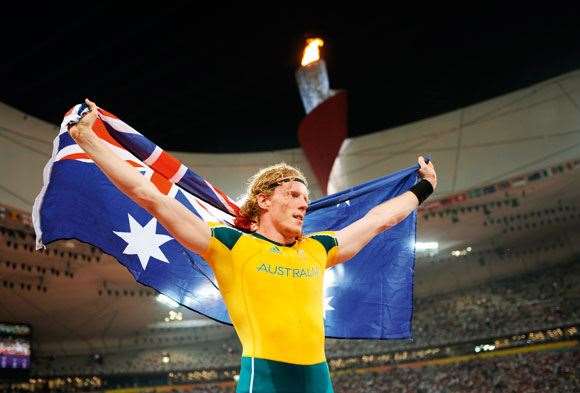 Hooker rocked the Bird’s Nest in ‘08. Images: Getty Images
Hooker rocked the Bird’s Nest in ‘08. Images: Getty ImagesWe marvelled as Steve Hooker’s dreams took flight in Beijing’s Bird’s Nest just 16 months ago. Four times he faced third-and-final attempts at heights during the Olympic pole vault competition. Four times he cleared them. His performance was a perfect Aussie victory, as gutsy as it was golden, as unashamedly happy as it was undoubtedly historic, a moment that made the 40 years since our last men’s athletics gold medal seem almost worth the wait.
So it appeared beyond reckoning that Hooker could return in 2009 and top his 2008 heroics. But, in defying injury, fear and general commonsense to achieve a miraculous win at the World Athletics Championships in Berlin in August, Hooker did just that.After injuring himself just ten days before he was due to compete, Hooker’s world champs looked over. He would take only three jumps, making two of them – one to qualify for the final, the other, at 5.90m, to win gold two nights later. Cathy Freeman is the only other Aussie to win both World and Olympic athletic titles – rare company for the ex-pat Victorian, now based in Perth, to keep.
We applaud his feats and name him our Worldbeater of the Year for 2009. But we also celebrate him for being the type of 27-year-old superstar you’d be proud to call a mate. In a year where the usual rollcall of buffoons, drunks and boys behaving badly made headlines for all the routinely wrong reasons, Hooker was a class act. He found time for a quiet coldie and chat with Travis Cranley
This time a year ago you were getting used to being introduced as an Olympic champion. Now you’re also a world champion and the Aussie record-holder at 6.06m. Is there any way 2009 topped 2008?
I’m not giving either of them back. With 2009, it was really a year in two halves. The first half was my indoor season and Australian summer, which I could not have been happier with. Jumping the Australian record of 6.06m (at Boston in February)
was a huge goal. The heights I was jumping and my level of consistency were both really pleasing. That gave me a lot of confidence coming into the European summer.
Then the second half was the European summer. It started really tough. I couldn’t get any rhythm. I was showing good form in training but I just couldn’t find any rhythm in competition. It was strange because I kept similar timing to previous European campaigns. We targeted the same lead-up events, we were based in the same city (Cologne, Germany), all that sort of stuff was fine. It just wasn’t happening.
Did you suffer any post-Beijing blues, given the emotional success you experienced in becoming Australia’s first field athlete to win a gold medal in 60 years?
I did struggle getting back into training after Beijing, but only for a couple of weeks. As soon as I started pole vaulting again, it was awesome. For the first time in about 24 months I didn’t feel under any pressure. It felt like I was just doing it for fun and I was really enjoying myself. I didn’t have the pressure of the big event coming up and holding me back.I think that’s why I jumped so well in the indoor season at the start of the year. I still had the same form and technique I had at the Olympics, but there was a weight off my shoulders. When that happens, that’s when you get good results.
It HAS been a mad 16 months for you since Beijing, hasn’t it?
Absolutely crazy. It’s all been a big change. Becoming a higher profile sportsperson, especially in Australia, is a different experience and you have to adapt to a lot of things. But I’m just trying to be me and stay true to myself and not let it change the fundamentals of my personality or the relationships I have with my friends.
Given what you’ve been through, are there any “wow” moments which really stick with you?
A lot! Going on Rove and having Will Ferrell and John C. Reilly dress up as me – well, that was definitely surreal. I couldn’t really get to sleep after that one. Being able to hand over the Melbourne Cup before the race last year, that has to be right up there. Being in a motorcade at the AFL grand final was another. All these things are just highlights I never expected to enjoy in a lifetime.
When you’re at events like those, do you take pride in putting the sport of athletics back on the centre stage of Aussie sports?
It’s not just me who takes the credit for athletics being back there. Sally McLellan and Jared Tallent were both incredible in Beijing, and this year two young athletes, Dani Samuels (gold in the women’s discus) and Mitchell Watt (bronze in the men’s
long jump) stepped up at the Worlds, so too did the 4x400m guys (bronze). We’ve just had our most successful ever world championships team. That’s not just me, that’s the team as a whole, athletes and support staff. And that follows our most successful Olympics in 40 years last year. This is the best team we’ve had in the modern age. And it’s a young team, so things are only going to get better heading into London.
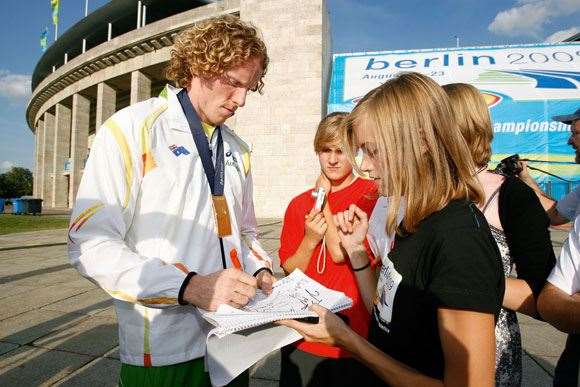 The fans find him at the Worlds. Images: Getty Images
The fans find him at the Worlds. Images: Getty ImagesAnd this success as a group is coming so soon after athletics appeared to be in such serious doldrums in the years following Sydney 2000 …
Again, you’ve got to recognise this is a young group of athletes. The majority of them weren’t involved with the recent darker times of athletics here. Most have been around only from Melbourne 2006, and the truth is there have been some pretty good times since then. The Melbourne Commonwealth Games were a highlight (Hooker won gold, his first major international title), then Beijing last year and the Berlin World Championships – we’ve strung together a few very good meets. It’s also created a really good atmosphere in the team in which everyone is supportive of each other and positive about going out and performing well.
We’d better get back to 2009. You’ve sailed through the start of the year and are finally finding form in the lead-up to Berlin in August. Then a fortnight from the Worlds, your luck goes through the floor. What happened?
I got an injury at the worst possible time. It was an adductor injury to my right leg, below the groin.
Had one of those before?
No, it was the first time I’d had anything like it. I’d done a really fantastic training session in what was to be my third-last pole vault session before the World Championships. Then, in what would be my second-last training session, I was at my third or fourth jump of the session and it felt like it just went on this movement when I took off. So we stopped that session straight away and we acted instantly to treat it because we knew how short the timeline was to get it right. This was only ten days before the qualifying round of my event.
What support did you have around you at the time?
I had my coach Alex Parnov and physio Shane Kelly who travelled with me the whole summer. Shane is the AIS scholarship physio and he was all over it from the outset. He was probably my biggest support over this period. He was the one who kept telling me I could get back, that I’d be able to get to Berlin.
How close were you to pulling out?
The whole way there we didn’t know if I’d actually compete. That was right up until the moment I jumped. For the qualifying round, the plan was I wasn’t going to warm up properly until I got out on the track. The normal routine you would do for any competition, particularly a world championships, is you’d do a solid warm-up for between 45 minutes and an hour, then go through the call room procedure, then you’d have an hour out on the track to work out your run-up and what poles you are going to use, during which time you’d probably do three or four jumps. Then you’d open the competition with a height you know you are going to clear pretty easily just to ease yourself into the event. That’s the normal series of events, which is about a three-hour process in total.I had to go in knowing that if I warmed up, I wouldn’t be able to cool down again. I might only have one jump in me given the nature of the injury. So I just had to wait to get out on the track and warm-up as the competition was starting around me. Then I had to open at a height which I was confident would qualify me for the final. It wasn’t until I completed that warm-up and things felt okay that I thought I’d take that one jump.
Two nights later in the final, you had to pretty much stick to the same non-routine, right?
Yeah. I took three jumps at the World Championships. I made two. I made the one jump in qualifying at 5.65m to reach the final. Then I missed my first jump at 5.85m in the final. Then I cleared 5.90m, which won me the gold.
Ending up as the world champion seemed to genuinely shock you on the night …
Even if I’d got to Berlin in great shape, it was never going to be a gimme that I could win the competition. So, to be honest, after the qualifying round, I thought if things went extremely well I could go out there and get lucky and maybe win a medal. For it to work out how it did (shakes head) … Probably missing at 5.85m worked out well because I was able to take that second jump. Maybe if I’d got 5.85m and stopped, one of those other boys would’ve got 5.90m …
Could you have gone again after 5.90m?
It’s hard to say. I really don’t know. I’m just glad I didn’t have to find out. The thing is I was so emotionally drained after clearing 5.90m. If you see the footage, I get very emotional after it, and it’s hard to come back once you have that kind of moment in a competition. I was just so focussed for the whole week leading up to that moment and then as soon as that moment had passed it all just left me a little bit.
So if someone could offer you a deal whereby you get only one jump at 5.95m at the London 2012 Games to defend your Olympic title, what would you say?
I hope it doesn’t come down to that. But, now, if it did come to something like that, I’d attack it with confidence. I’d give myself every chance of clearing it. I wouldn’t say I couldn’t do it, which is probably what I would’ve said in the past.
In 2008 I watched you train in a pit set up next to an indoor public swimming pool in Perth. I remember wondering how you could maintain such huge goals while reduced to such humble training digs. How did you do it?
It’s not as much of a stretch as you may think. A run-up, a box, a bar – it’s all the same wherever you are. As long as it’s not pouring with rain or you have gusting winds blowing your pole all over the place, it’s all the same. It’s all about what happens within yourself: how you feel on the runway, how you approach the jump, how you move once you get off the ground. Whatever setting you’re in, if you’re really focussed, you can take yourself to the place you need to be.
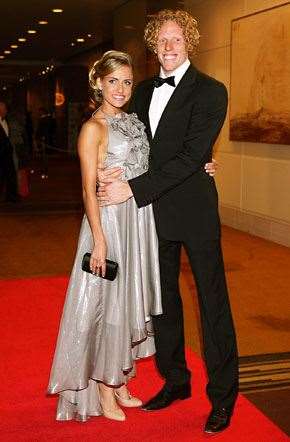 Steve Hooker and Russian Sprint Girlfriend. Images: Getty Images
Steve Hooker and Russian Sprint Girlfriend. Images: Getty ImagesSergei Bubka’s world record in your event is 6.14m. Is the world record a realistic goal for you?
Sure, but it’s not entirely the same. If you look at results of pole vault over the decade, you’ll see the rule changes’ impact. Results were very strong all the way through the ‘90s, then the rule changes came in post-Sydney 2000, and results dropped. People can say you have to “clear” the bar to clear the bar, but what the rule change did was remove a small element of luck from the event. For me, one of the most exciting moments in a pole vault event had been seeing the guy knock a bar, it bounces and stays on. That’s an exciting element you hardly see any more. Now if you touch it at all, it’ll fall off.
Your coach Alex Parnov was a contemporary and rival of Bubka back in the former USSR. Is he among the people cheering you on to beat the record?
Everyone is keen to see that record go down. It was 1994 when Bubka’s record was set, which is time enough. There are a lot of guys getting up to that level, working out how to consistently get to those heights. And with me are a lot of young guys who have essentially been jumping all their careers with the short pegs, so it’s not an adjustment they’ve had to make. Everyone wants to see the record go down and the sport progress. Bubka will always be the greatest pole vaulter that’s lived, whether he holds the world record or not. We all want to see progress.
Your girlfriend, Russian 800m runner Ekaterina Kostetskaya, is training with you in Perth. Given both your travel schedules, it must be nice to have some steady time together ...
It’s still a fairly fresh relationship. We’ve been seeing each other consistently since June. She’s training here in Australia with me for a couple of months, so she gets to see where I live and meet my family. It’s been really good.
You’re a native Victorian who now calls Perth home. They recently opened the new WA Athletics Stadium. Have you been able to check it out?
I was there at its official opening. It’s going to be an unbelievable place to pole vault. I can’t wait. I’ll be jumping hopefully through the summer months, assuming I’m healthy. The stadium will host the Aussie champs in April, which are after the World Indoor Championships (in Doha in March). We’ll contest some low-key club events there before that.
Whether it’s a club meet or world champs or anything in Perth, you have an opportunity to jump high because the conditions are so good. My first six-metre jump was in a club competition at the old Perry Lakes Stadium.
Both your Mum and Dad represented Australia in athletics. (Erica was a 1972 Olympian and 1978 Commonwealth Games silver medallist in long jump; Bill raced the 800m and 4x400m at the 1974 Comm Games.) Have they been around for your biggest wins?
I’m one of four kids, so they have a few of us to worry about. Mum and Dad didn’t go to Beijing, but they were in Berlin. They prefer the World Championships, which is less of a circus than the Olympics, and they like it when the focus is just on athletics.
Berlin really was just a fantastic event. It was the best crowd you could wish for, an amazing stadium to compete in, even the mascot was the best mascot you could’ve hoped to find. I look back and it was all just such great stuff.
– Travis Cranley
Related Articles
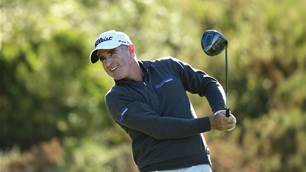
Video interview: Drinks With ... Matt Millar

I was not born to run
